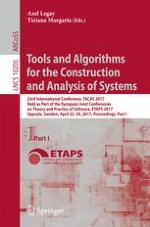2017 | OriginalPaper | Buchkapitel
Hierarchical Network Formation Games
verfasst von : Orna Kupferman, Tami Tamir
Erschienen in: Tools and Algorithms for the Construction and Analysis of Systems
Verlag: Springer Berlin Heidelberg
Aktivieren Sie unsere intelligente Suche, um passende Fachinhalte oder Patente zu finden.
Wählen Sie Textabschnitte aus um mit Künstlicher Intelligenz passenden Patente zu finden. powered by
Markieren Sie Textabschnitte, um KI-gestützt weitere passende Inhalte zu finden. powered by
